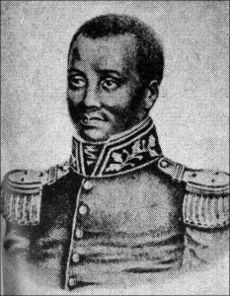 Today is a holiday in Haiti! Since this day played a crucial point in our independence. It used to be called the Day of the Army as well since the army was dissolved it is just Battle of Vertière. Vertière is just a place
Today is a holiday in Haiti! Since this day played a crucial point in our independence. It used to be called the Day of the Army as well since the army was dissolved it is just Battle of Vertière. Vertière is just a place The battle of Vertière, the last large battle of the Haitian Revolution (Haitian war of independence) was fought between Haitian rebels and French expeditionary forces on November 18, 1803 at Vertières.
Haitians led by Jean-Jacques Dessalines attacked a strong French-held fort of Vertierre, near Cape Français (to the north of Haiti) and won a decisive victory over French colonial army under General Comte de Rochambeau and forced him to capitulate the same night. Haitian Ninth Brigade under François Capois played a crucial role in the victory.
As a result, independent Republic of Haiti was proclaimed on December 1, 1804.
November 18 has been widely celebrated since then as a Day of Army and Victory in Haiti.
Now... Let's go deeper in the history for those of you who are more inquisitive:
The Battle of Vertieres (Kreyòl: Batay Vètyè; French: Bataille de Vertières), a defining campaign in the Haitian revolution, took place on November 18, 1803. In this clash, south of Le Cap Haitians led by Jean-Jacques Dessalines and Alexandre Pétion ultimately defeated the French troops under General Rochambeau.
The last and defining Battle of the Haitian Revolution
This last large battle of the Haitian Revolution, the Haitian War of Independence, was fought between Haitian rebels and French expeditionary forces. This decisive blow was a major loss for France and it's colonial empire. Haitians led by Jean-Jacques Dessalines and François Capois attacked a strong French-held fort of Vertières, near Cap François (in the north of Haiti) and won a decisive victory over French colonial army under General Comte de Rochambeau and forced him to capitulate the same night.
The Haitian Ninth Brigade under François Capois played a crucial role in the victory and caused Napoléon's troops to abandon their stronghold. This battle occurred less than two months before Dessalines declaration of independence (On January 1, 1804) and delivered the final blow to the French attempt to re-institute slavery, as had been the case in the other Caribbean possesions, and to stop the Haitian Revolution.
Another leader of the fight at Vértieres was Louis Michel Pierrot, the husband of the mambo Cécile Fatiman who had led the vodou ceremonies at Bois Caïman on August 14, 1791 together with Boukman.
The first major defeat of Napoléon's army
Napoléon Bonaparte, who had come to power three years prior to the Battle of Vertières (Through a coup d'etat on November 11, 1799), was given his first major defeat when he lost this crucial battle against the Haitian revolutionary forces. The French lost many experienced troops in the last year of fighting (1803) in Saint-Domingue and after the Battle of Vertières, their military and political strength in the Western Hemisphere was significantly weakened.Even though Napoléon had mobilized about 30.000 troops that, in 1802, sailed in huge fleets from France to re-establish slavery in it's most profitable colony [Saint-Domingue], and had given up control over much of the territory he controlled in the Americas (see: The Haitian Revolution and the Louisiana Purchase), the Haitian troops commanded by Toussaint Louverture and later Jean-Jacques Dessalines won the war, culminating in the Battle of Vertiéres. This defeat, the French troops fled for France soon after loosing the final battle, was a major blow to the French empire, having been cut of from it's biggest source of income: the profits of plantation slave labor in Saint-Domingue.
For the Haitians, who would soon declare independence, the outcome of the battle of Vertiéres signaled the final defeat of the cruel treatment they had to suffer from the hands of the French colonizers. Rochambeau's defeat is still seen as a milestone in the fight against slavery and paved the way for the abolition of slavery in other countries, although Haiti was the first black republic in the hemisphere and the first nation to rid themselves from the terrors inflicted by the European colonialists.
The Battle of Vertières is a monument to Haiti's achievements as well as that of it's outstanding military leader at the time: Jean-Jacques Dessalines. Toussaint Louverture, who had died in April of 1803 in French captivity at Fort de Joux, had laid the groundwork for the defeat of France. It was Jean-Jacques Dessalines, who carried on as the leader of the Haitian troops and united the revolutionary forces, that made the win over the cruel General Rochambeau a possibility.
"[Rochambeau's] ferocious and sanguinary spirit was too much for the kind heart of Toussaint, or the gentlemanly bearing of Christophe. His only match was Dessalines." (Wells Brown p. 111)
Battle of Vertières' Day
November 18 has been celebrated since then as the Bataille de Vertières day (Battle of Vertières' Day) this day also used to be Armed Forces Day (French: Jour Des Forces Armées) in Haiti. President Jean-Bertrand Aristide abolished the Haitian army in the early 1990's.(source haitianmedia.com, thelovertureproject.org)







